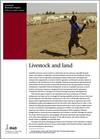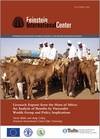Equitable and secure access to land is a critical factor for the rural poor, especially livestock owners, who depend on agriculture and animal-related activities for their livelihood. This thematic paper is based on the assumption that secure investments in livestock infrastructure and assets can be encouraged by ensuring equitable and secure access to land, and that this approach will help reduce rural poverty. To this end, it identifies experiences and lessons learnt regarding livestock and land-related issues, drawing on experiences from IFAD development projects and programmes all over the world, with a special focus on Africa. It examines the following interrelated issues: livestock and access to land, access to reliable sources of water, encroachment, land degradation, grazing and mobility.
Year of publication: 2009Organization: International Fund for Agricultural Development (IFAD)
Topic: Economy, Land, Value addition
Language: English
Type of document: Technical
Geographical coverage: North Africa, West Africa, Central Africa, Eastern Africa, Southern Africa
This paper addresses the challenge of educating nomadic peoples in the context of rapid global socio-economic change. First, it maps out the conceptual terrain, analysing the key debates in relation to terms that are often misleadingly used as if they are interchangeable – education, schooling, and learning. Second, the paper reviews successful and innovative approaches to education provision around the world that can inform and inspire new approaches to nomadic education.
Year of publication: 2009Organization: International Institute for Environment and Development (IIED)
Topic: Education
Language: English
Type of document: Scientific
Geographical coverage: Global
This report examines if and how different wealth groups benefit from the livestock export trade. It looks in detail at the household-level economic strategies of different pastoralist wealth groups and their marketing behaviors. It also explores the apparent contradiction between increasing levels of pastoralist destitution in the Horn of Africa, and increasing exports of livestock and livestock products. The publication concludes that in terms of poverty reduction, poorer herders benefit least from livestock exports.
Year of publication: 2009Organization: Feinstein International Center
Topic: Economy, Value addition
Language: English
Type of document: Technical
Geographical coverage: Eastern Africa
This book is about the critical role mobile livestock keeping plays in the economic prosperity of Africa's drylands. Pastoralism rellies on unique production strategies with the ability to move being most critical. New policies and innovative practices for pastoralist mobility are beginning to take root in many parts of dryland Africa. Livestock mobility is a modern approach to poverty alleviation and accelerated development. Supporting mobility does not require huge financial investment: it requires refreshed thinking and clearer understanding. This book is a starting point.
Year of publication: 2009Organization: International Institute for Environment and Development (IIED)
Topic: Climate change, Economy, Food security, Land, Resilience, Value addition
Language: English, Français
Type of document: Technical
Geographical coverage: West Africa, Eastern Africa
This booklet answers the basic questions around pastoralism about its importance and main challenges. It was produced under the Regional Pastoral Livelihoods Advocacy Project (REGLAP).
Year of publication: 2009Organization: Individual authors
Topic: Education, Participation
Language: English
Type of document: Technical
Geographical coverage: Global
La mise en œuvre de la Composante « Aménagements pastoraux et organisation de la transhumance transfrontalière » sera conforme à celle du Sous-programme « Gestion améliorée des autres ressources naturelles partagées » du Programme régional d’investissement agricole (PRIA) de la CEDEAO. Pour ce faire, elle adoptera les principes directeurs retenus dans l’ECOWAP, en l’occurrence : le principe de subsidiarité, le principe de proportionnalité, le principe de complémentarité, le principe de régionalité, le principe de solidarité, le principe de partenariat et de concertation et le principe de progressivité.
L’objectif principal de la Composante est de créer les conditions d'une exploitation durable et non conflictuelle des ressources pastorales transfrontalières en vue d'améliorer les conditions de vie des populations. La zone d’intervention couvre les quatre principaux axes de transhumance régionaux identifiés (Axe central, Axe Ouest, Axe Est et Axe Nord-Niger – Nord-Nigeria). Les zones de départ, les pistes et couloirs de transhumance transfrontaliers, les zones de transit et les zones d’accueil des troupeaux transhumants constitueront les zones de concentration de l’intervention.
Year of publication: 2009Organization: Individual authors
Topic: Conflict, Environmental services, Land, Organization
Language: Français
Type of document: Policies and legislation
Geographical coverage: West Africa
The purpose of this booklet is to illustrate how the idea of scenario planning is being used to help pastoralists in Africa manage uncertainty and change. It is written with community development workers primarily in mind - for those who may be interested in facilitating scenario planning with communities and wish to know more about it. It describes the process involved and discusses the benefits, challenges and implications of the approach.
Year of publication: 2009Organization: International Institute for Environment and Development (IIED)
Topic: Climate change, Conflict, Education, Innovation, Organization, Participation, Resilience
Language: English, Français
Type of document: Technical
Geographical coverage: North Africa, West Africa, Central Africa, Eastern Africa
This open access, interdisciplinary and peer-reviewed online journal featuring over 130 articles investigates extensive livestock production systems throughout the world. It publishes research that influences public policy to improve the welfare of pastoralists and better conserve the environments in which they live.
Year of publication: 2009Organization: Individual authors
Topic: Climate change, Conflict, Economy, Education, Environmental services, Finance, Food security, Gender and youth, Healthcare, Indigenous knowledge, Indigenous peoples, Innovation, Land, Organization, Participation, Resilience, Social services, Value addition
Language: English
Type of document: Scientific
Geographical coverage: Global









